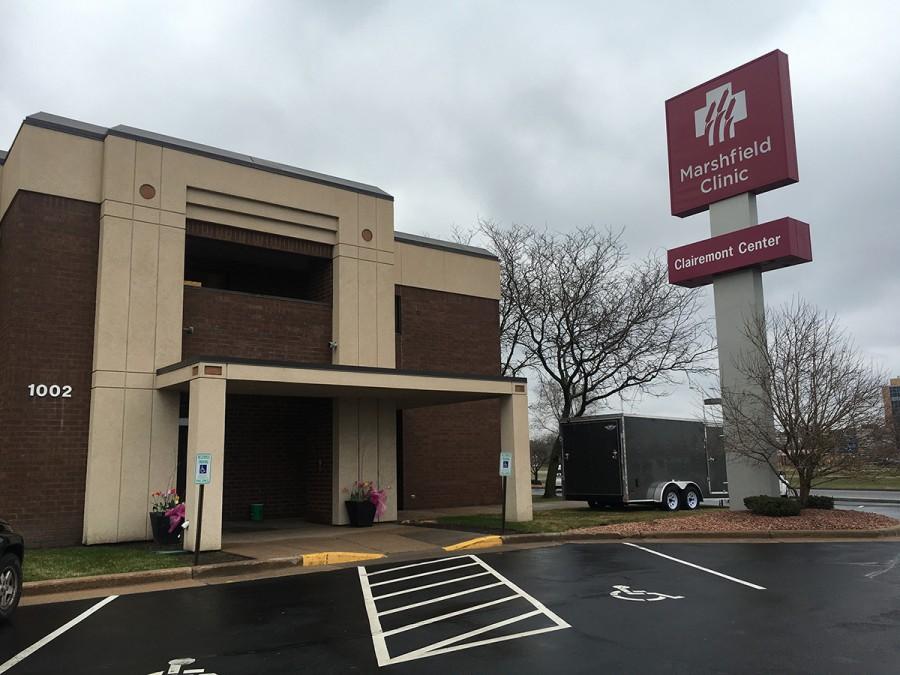Students volunteers help solve social disparities in healthcare in the community.
Students work with patients who need assistance and help connect them to community resources
More stories from Andrea Montgomery
Photo by Andrea Montgomery
Student volunteers team up with the Marshfield clinic to make an impact in the community.
It can be hard to see the struggles of others outside of campus and student life in Eau Claire.
Many families in the area need assistance with food, clothing and shelter. To combat these issues, a partnership between UW-Eau Claire, the Marshfield Clinic and the Family Health Center of Marshfield Inc. is using volunteer students to assist patients with their needs.
Marshfield Clinic providers and Family Health Center Inc lead the Community Connections Team and the Community Care Allies volunteer as community health workers in an office at Marshfield clinic.
The program stemmed from a university honors program civic engagement course and is supported on campus by the Health Careers Center, Institute for Health Sciences, University Honors Program, and the College of Arts and Sciences, Education and Human Sciences, and Nursing and Health Sciences.
The two organizations were launched in March 2015 and have connected more than 300 patients with community resources in the intervening year.
Students connect patients with resources to help aid them with social disadvantages. Doctors at the clinic give a survey to their patients, and their patients are able to mark boxes to indicate what they need assistance with, said Norah Airth-Kindree, an assistant professor of nursing and a founding member of the Community Connections/Community Care Allies initiatives.
She said volunteers then meet with patients and are able to connect them to resources in the community that will help them with specific needs.
These organizations were founded on the recognition that healthcare doesn’t always adequately treat the patient because they treat the illness and not necessarily the underlying cause, Airth-Kindree said.
As a result, 90 percent of health outcomes are effected primarily by social, behavioral and environmental factors, she said.
Airth-Kindree said these causes may include issues, such as not being able to pay for heating during the winter or lack of access to healthy food; health factors not addressed by traditional health care, but causes for short-term and long-term illnesses nonetheless.
“Public health is about stopping (illnesses) upstream before it comes down,” Airth-Kindree said. “You can do the simple things before someone needs open heart surgery.”
Rick Behlmer is a senior biology student who volunteers for Community Care Allies. He was a member of the pilot program for Community Connections.
“A whole lot of health care is the social side,” Behlmer said. “This patient isn’t receiving the nutrition they need, these children don’t have proper winter clothing, that affects your overall health. Healthcare is a lot more than just take this medication, there are a lot of social aspects to it.
Behlmer said as a result of the program he has a greater awareness of the disparities and inequalities in the community and believes it will help him be a better physician in the long run.
Patrick Disterhaft is a senior pre-med student and president of Community Care Allies. When the program began only a few physicians agreed to hand out surveys to their patients and get on board with the program, he said.
“Once those first few physicians got results back they saw that we were actually helping a lot of people,” Disterhaft said.
Now the entire pediatric department and the entire women’s health department at Marshfield Clinic pass out surveys and Disterhaft said he estimates there are 20 to 30 doctors on board with the program after seeing the results.
Jack Kelly, a sophomore finance and biology student, said he got involved with the program through the pre-professional health club. Kelly said he enjoys the program because he gets to help people directly.
“Some people who come in are Hmong or Hispanic and don’t speak english, when that happens we call an interpreter” Kelly said. “Patients are very trusting, we can see their whole medical records and that’s a big deal.”
The Marshfield Clinic Chippewa Falls Dental Center will also soon be involved in the program to reach out to patients who do not have access to dental care, Airth-Kindree said.
She said anyone can join the Community Care Allies irrespective of their area of study. Volunteers are expected to participate over a two-semester period.











